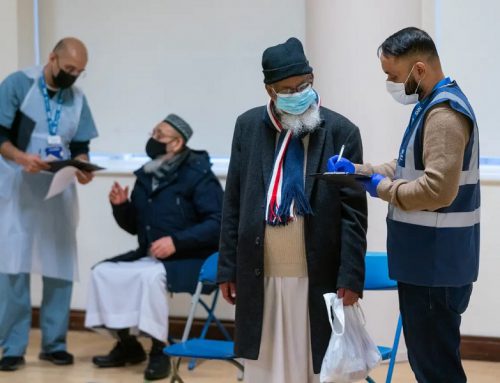Perhaps one of the most important misconceptions among those advocating violence and extremism in our Islamic history and our present reality is the concept of the promotion of virtue and prevention of vice. This noble act has been widely cited and encouraged in the Quran, and its establishment is celebrated in the noble Sunnah as a coveted value of the Muslim community. Allah said, “Let there arise out of you a band of people inviting to all that is good, enjoining what is right, and forbidding what is wrong: They are the ones to attain felicity.” [3: 104] An authentic hadith narrated by Sa’eed al-Khudri reported that I heard the Messenger of Allah (ﷺ) say, “Whosoever of you sees an evil, let him change it with his hand; and if he is not able to do so, then [let him change it] with his tongue; and if he is not able to do so, then with his heart — and that is the weakest of faith.” [Muslim]
It is evident that the matter of establishing virtue and prohibiting vice is a fundamental pillar of religion in Islam and a requirement for the eminence of the Muslim society as described by God. It is not possible for a state to sustain power and authority when its people have lost self-direction and a sense of collective and individual behavioural guidance that preserves the security and safety of its members and achieves the noble message of the heavenly mission of human succession on earth to achieve justice.
From this viewpoint stems the importance of commanding virtue and the prevention of vice. A comprehensive definition of this concept can be extracted from the Quranic verses and Sunnah to mean the following: “The command that achieves the intended goals of God in all affairs of life, and the prohibition of everything that destroys and disrupts the order of God in all life affairs.” The issue that arises here concerns the mechanisms for applying this mandate on the ground, especially in our contemporary societies that are governed by modern states that assume responsibility for the defence, supervision and management of all state affairs. These have been delegated as official functions of specified institutions that are supervised by the state.
The dilemma is the limited understanding of those who speak in the name of religion regarding this Quranic concept, which includes, as we have mentioned, all the affairs of life. The literature on the topic has focused on how this concept has been operationalised to censor certain practices concerning social behaviour and has overlooked the greater values of this religious obligation. This is illustrated below.
One of the ways of achieving God’s purpose in the universe is the administration of justice. Therefore, every activity carried out by any individual in the community to achieve justice is a matter of virtue. Every activity one takes to stop injustice is a prohibition against vice. The Parliament is a reform of the economic system to achieve justice in the distribution of wealth. It is a command of virtue, and preventing its opposite (poverty) is a means of preventing evil. Among Muslims and who writes in the newspapers revealing the errors of the ministries of health and transport and other ministries in providing good services for citizens is practising good (perfection) and is forbidding evil (waste). Likewise, civil society institutions tasked with cleaning the streets is enjoining good (cleanliness) and preventing vice (filth). Moreover, the donor and volunteer in literacy programs are enjoining good (knowledge) and denouncing evil (ignorance). The policeman seeking to control the traffic is seeking good (order) and preventing evil (chaos). The person calling for harmony between Muslims is enjoining good (unity) and preventing evil (division). The programs and psychologists seeking to motivate positivism through programs and lectures are enjoining good (positivism) and preventing vice (despair and frustration). The father ordering his son or person ordering his friend to collect waste thrown from the car window is enjoining good (cleanliness) and preventing evil (filth) along with many other examples of applying this noble concept. If all Muslims were to fulfil this duty in good practice and advice, the Muslim community would achieve peace, security and order to realise the intended goals of God regarding His servants and the goals of the divine law.
However, the fact is that many Muslims understand this duty in a manner that is detached and contradicts the purposes of religion rendering it a hated act in the hearts of many Muslims to the extent that the phrase “enjoining virtue and forbidding evil” has become a cause of fear among many Muslims. This is because this obligation has been removed from the public responsibility and as a broad overarching concept pertaining to all matters of life, and delegated to marginal acts. Furthermore, there are conditions. It should be understood that not all that which contradicts your sensibilities is a vice as people differ in their levels of understanding, culture, and madhhab. People have confused the concept and applied it to marginal matters in which there are differences of opinion such as wearing the veil (niqab), listening to music, proper attire, people’s hairstyles, the length of one’s beard, controlling peoples tastes and preferences, etc. which are not areas that fall under the domain of the concept (such as al-Tawhid, administration of justice, honesty, security, modesty, loyalty, purity, piety …) and do not propagate (as such) Quranic sin (polytheism, infidelity, injustice, fraud, hypocrisy, greed, bloodshed…). Most of their concerns regard the so-called branches of religion in so far as there is no consensus among the Muslim scholars. In such a way, the duty to enjoin good and forbid evil has changed from being a mechanism that renews the life of the community and vitalizes its dynamism to one that kills it and causes it to stagnate. Its incorrect application encourages an aversion to Islam and its laws and is a door to chaos and disorder in the religion and community.
Currently, the concept is being used as a mechanism to suppress Muslim societies and expose people’s faults in what is a clear contradiction with the Quranic approach. “Invite (all) to the Way of thy Lord with wisdom and beautiful preaching; and argue with them in ways that are best and most gracious.” [16: 125] “It is part of the Mercy of Allah that thou dost deal gently with them Wert thou severe or harsh-hearted, they would have broken away from about thee: so pass over (Their faults), and ask for (Allah’s) forgiveness for them; and consult them in affairs (of moment).” [3: 159] This is among the crimes of Daesh in the cities which they govern. They incorrectly believe that they are establishing virtue and forbidding evil by murdering people en masse and applying capital punishments without clear evidence. It is the very opposite to the Quranic spirit and the spirit of the Sunnah which are educational and nurturing and only meted out punishment when all other approaches failed, and their corruption is public and evident.
*Dr.Tarik Ladjal is Professor of History at Effat University in Jeddah, Saudi Arabia





